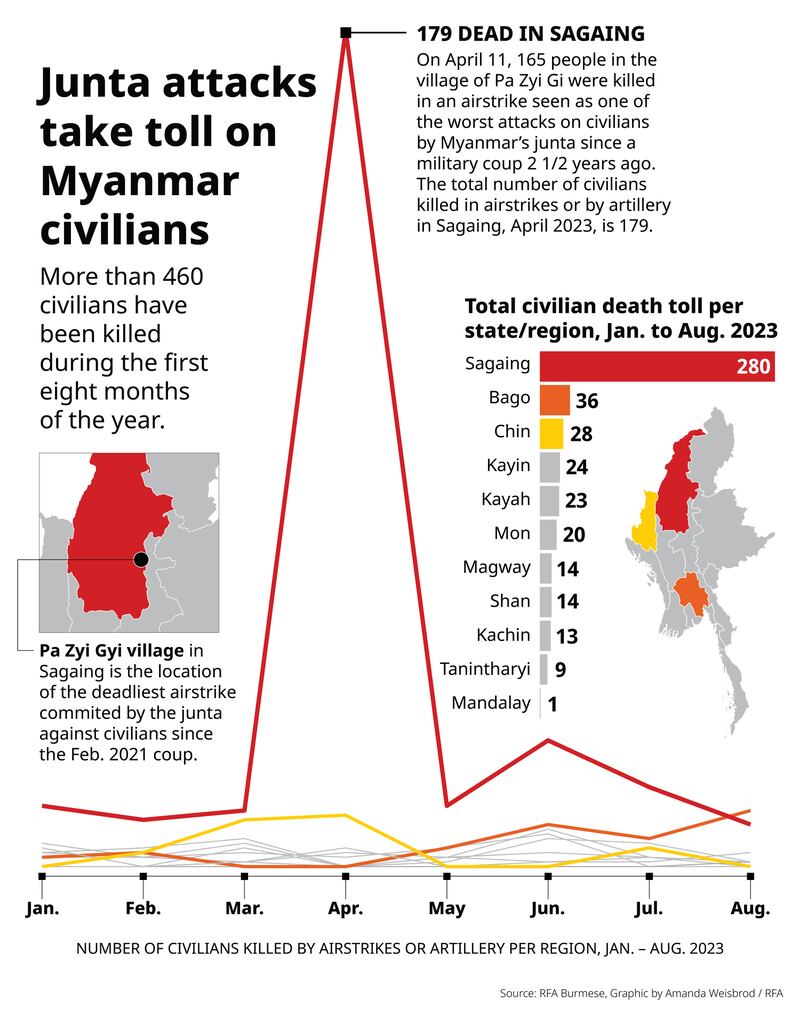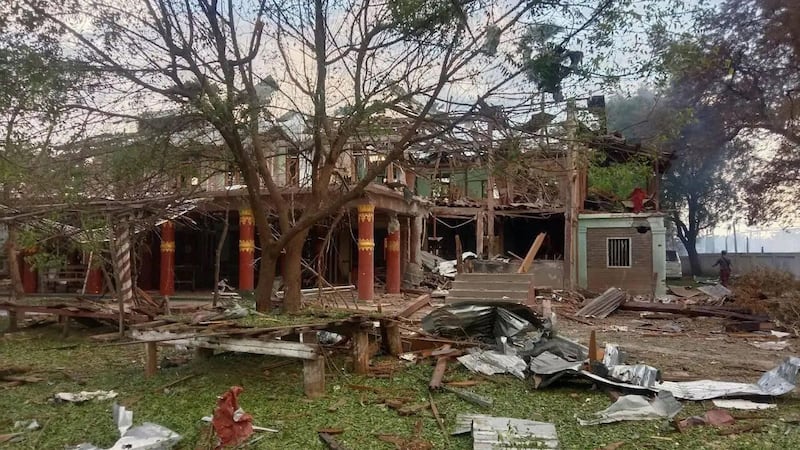This story includes graphic content.
Saw Ba Bal Sal Pho had just returned home from taking his 8-months-pregnant wife to get examined at an hospital in Bago region’s Kyaukkyi township when he realized that he had left his mobile phone at the doctor’s office.
The 28-year-old father of three was advised to wait, as a military jet had been spotted in the area but he decided to quickly make the trip, a resident who is close to the young man’s family named Saw Alexander told RFA Burmese.
The decision turned out to cost him his life.
As he made his way across the Baw Ka Htar bridge near his home village of Hpa Yar Gyi, the aircraft dropped six bombs, killing him instantly.
Saw Ba Bal Sal Pho, killed Aug. 24, is just one of 462 civilians killed by junta airstrikes and artillery fire across Myanmar during the first eight months of the year, according to data compiled by RFA Burmese. At least 812 others were wounded in the attacks.
According to Thailand’s Assistance Association for Political Prisoners (Burma), junta authorities have killed at least 4,071 civilians since the coup.
“While on the bridge, he was hit by the military’s aerial bombs,” Saw Alexander said. “Half of his head was blown away. Only his face was left. His stomach was blasted open and … his intestines spilled out."

The junta, which took control of the country in a 2021 coup, has stepped up attacks by jets and artillery in the northern Sagaing region, as well as Kachin and northern Shan states, because they see it as more effective than ground offensive and undermining their morale, said Col. Naw Bu, a spokesman for the ethnic Kachin Liberation Army, or KIA.
“The junta realized that its strategy of deploying offensive columns on the ground is too risky,” he said. “Additionally, they seem to believe their shelling and air attacks are lowering the morale of the resistance quite a lot."
Naw Bu claimed that the military was also targeting civilians during these attacks.
Attempts by RFA to contact junta Deputy Information Minister Major Gen. Zaw Min Tun went unanswered.
Thein Tun Oo, the executive director of the Thayninga Institute for Strategic Studies formed by former military generals, told RFA that the military “does not condone civilian casualties in meeting its military objectives” and “cannot be blamed” for the deaths.
“Whenever there is a battle in areas close to the civilian population, civilian deaths are inevitable,” he said. “You can’t blame them for using heavy artillery weapons. According to the Rules of Engagement (ROE), when in battles, you can’t spare civilians or anybody. As the military has a task to execute, it cannot be too merciful.”
Action needed ‘immediately’
In another case in late August, a shell fired by the military’s Kha-La-Ya Light Infantry Division during a battle with the anti-junta People’s Defense Force, or PDF, in Magway region’s Gangaw township exploded in the village of Saing Du, killing one resident and injuring two others.
“They fired around the village with 60mm and 120mm artillery,” said a resident who, like some others interviewed for this report, spoke on condition of anonymity, citing fear of reprisal. “One of three shells they fired into Saing Du village hit the front of a house. Three people were injured and one of them was killed.”

Human rights activists are calling on international governments to pressure the junta over the air and artillery strikes, which they categorized as “war crimes.”
The longer the delay in taking action against the military, the more civilian casualties there will be, said the rebel National Unity Government, or NUG, Human Rights Minister Aung Myo Min.
"The military [leaders] will continue to crush and kill people as long as they can – even until their last breath – so we need to take some practical actions immediately, rather than holding discussions and giving presentations,” he said. “We especially need to effectively pressure the countries and governments that are involved in the export and sale of jet fuel to the junta to cut off their routes as soon as possible."
The NUG said that it wants to see economic sanctions on all imports of jet fuel for the military and is working to obtain technical assistance to install air traffic alert systems in Myanmar.
Translated by Myo Min Aung. Edited by Joshua Lipes and Malcolm Foster.
